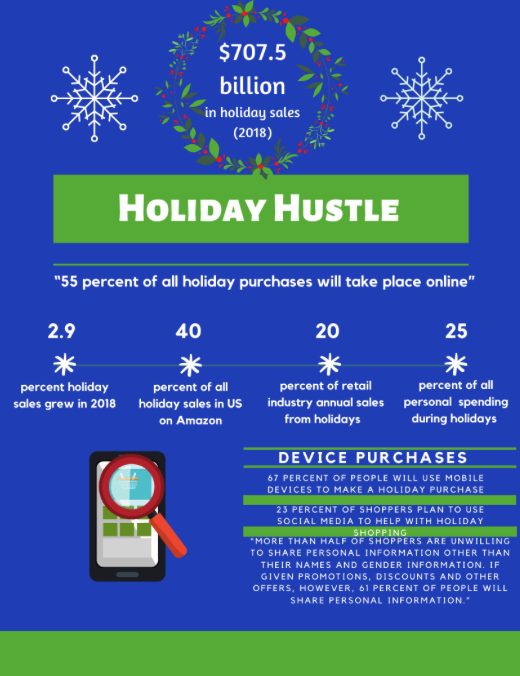Ho ho hoax
The holiday season proves to be among the busiest times of the year concerning sales. As the frequent usage of online shopping for gifts expands over time, so does the risk of encountering scams in search of one’s personal information. Statistics courtesy of websitesetup.org
December 23, 2019
“Congratulations, lucky user!” a website pop-up reads. “You’ve been randomly selected to obtain a gift from our sponsors!”
Upon first glance, people might express excitement after winning a free gift. Unfortunately, the promise of lavish prizes hides sinister intentions. The online trap, which redirects users to a sketchy page on their browser, displays a brightly colored wheel plastered with expensive goods on each panel. Seemingly, all one does is spin the wheel for a prize and answer a few questions about themselves.
Some tech users will close the tab or attempt to return to their original page before even interacting with the site, but others may not make the wise decision.
Certain scams lack professional appearance, making those traps online easier to avoid. However, scammers have become increasingly elusive in their attempts to suck personal information from users.
The prominence of scams is predicted to increase as the holiday season begins and millions take to online shopping.
This year, scams could reveal themselves as more unforgiving than the Grinch.
There have been roughly 6,000 cases of scams already in 2019, according to cyber security company Normshield. The prevalence of online shams have increased more than 10% in the last year.
The tricks continue to convincingly disguise themselves and expand on their techniques. Methods include fake shipping notices and order confirmations, along with accounts posing as online contact from large corporations. One of these targeted companies includes internet giant Amazon.
About 40% of all holiday sales in the US took place on Amazon last year, according to websitesetup.org.
Through their Prime accounts alone, Amazon claims to have shipped more than a billion products in the United States last year. Worldwide, the company announced a record breaking season of holiday purchases on their site.
Amazon representatives state their situation with scammers, especially those disguised as members of the company for information, is currently too sensitive for commentary. Nonetheless, employees reference the Help and Customer Services page on their website as a valuable resource when dealing with suspicious material.
Amazon is not the only frequented site. Walmart, eBay, and other companies serve as alternative shopping destinations for the holidays.
A looming 55% of overall holiday purchases will occur online this year, and more people will shop from their devices rather than in-store, says websitesetup.org.
“Consumers need to be diligent in verifying all the parties involved in the purchase by phone calls, face-to-face meetings, etc.,” explains the City of San Diego Official Website on their “Internet Crime” page.
The season is jolly, but scams can substantially dim cheerfulness brought by the holidays. A user may believe they have confirmed ordering a doll for their daughter, but in fact a delivery will not appear altogether. Even worse, their personal information has been shared across the web.
To assist online shoppers during a time already filled with busy preparation, businesses and government systems promote ways to avoid scams before it is too late.
“When they contact you, scammers will tell you to click on a link in their email. Or, they’ll ask you to give your bank account number to confirm your identity or verify your account,” according to the official United States government website’s online safety page. “Sometimes, they may even threaten to disable your account if you don’t reply. Don’t believe them. Legitimate companies never ask for your password or account number by email.”
Users can also access help centers on corporation websites for more information, including possible red flags associated with scamming and phishing attempts.
The buzz of excitement fills the air, sounding of childlike wonder and joyous bliss as the holidays approach. Nevertheless, individuals must remain aware of threats to their festivities, especially hidden hoaxes disguised to dampen the giving spirit of the season.





























































